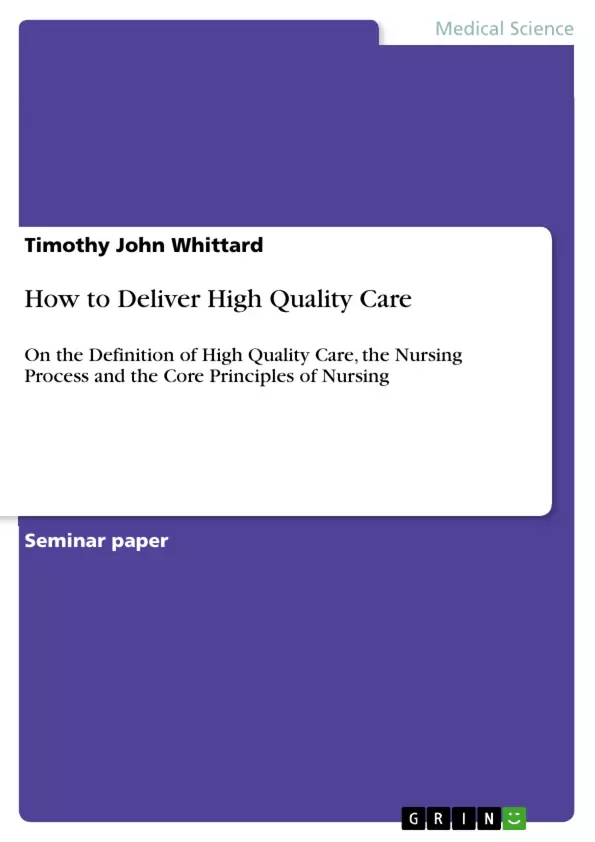This work focuses on the different ways how to deliver a high quality care.
The objectives of this presentations are; to explore what constitutes high quality care; to discuss the nursing process and the core principles of nursing that lay the foundations for good care provision; to highlight the findings from the Francis Report which relate to the way nurses are expected to provide care; to discuss the reasons for writing care plans, whilst exploring what constitutes a good care plan; and to explore the role of the named-nurse in the delivery of care.
The named nurse is of special interest in this presentation.
Table of Contents
- What is high quality care?
- Unconditional Positive Regard
- Principles of Nursing Practice
- Guidance from the NMC
- The Nursing Process
- The Francis Report
Objectives and Key Themes
This presentation explores the concept of high-quality care in nursing, emphasizing the importance of patient-centeredness, ethical practice, and evidence-based care. The aim is to provide third-year undergraduate nursing students with a framework for delivering safe and effective care.
- Defining high-quality care and its core elements
- Exploring the nursing process and its application to care delivery
- Analyzing the impact of the Francis Report on nursing practice
- Understanding the role of care plans in ensuring safe and effective care
- Highlighting the importance of ethical principles in nursing practice
Chapter Summaries
- What is high quality care?: This section defines high-quality care by referencing six core elements identified by King's College London, including patient-centeredness, efficiency, and evidence-based practice.
- Unconditional Positive Regard: This section discusses the concept of unconditional positive regard, introduced by Rogers (1956), and its importance in treating all patients fairly and respectfully.
- Principles of Nursing Practice: This section outlines core principles of nursing practice as outlined by the Royal College of Nursing (2018), emphasizing treating everyone with dignity, taking responsibility for care, and promoting patient-centered decision-making.
- Guidance from the NMC: This section summarizes the Nursing & Midwifery Council's (2018) guidance on providing good care, including keeping patients safe, showing kindness and respect, and providing clear information.
- The Nursing Process: This section outlines the four stages of the nursing process: assessment, planning, implementation, and evaluation.
- The Francis Report: This section discusses the findings of the Francis Report, which investigated failings in care at Mid-Staffordshire Hospital. The report highlighted the importance of thorough nursing assessments and the creation of appropriate care plans to ensure patient safety.
Keywords
This presentation focuses on the concept of high-quality care in nursing, emphasizing key themes such as patient-centeredness, ethical practice, evidence-based care, the nursing process, and the Francis Report. The presentation aims to provide students with a framework for understanding and implementing these concepts in their future nursing practice.
- Citar trabajo
- Timothy John Whittard (Autor), 2018, How to Deliver High Quality Care, Múnich, GRIN Verlag, https://www.grin.com/document/470798



